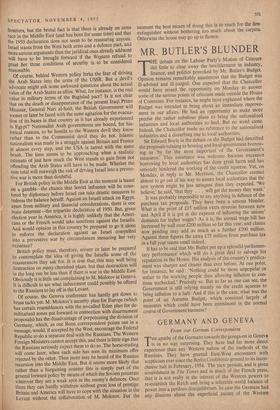MR. BUTLER'S BLUNDER
THE debate on the Labour Party's Motion of Censure did little to clear away the bewilderment in industry. finance, and politics provoked by Mr. Butler's Budget. Opinion remains remarkably unanimous that the Budget was ill-advised and ill-judged. One expected that the Chancellor would have seized the opportunity on Monday tb answer some of the serious points of criticism made outside the House of Commons. For instance, he might have explained where the 'Budget was intended to bring about an immediate improve- ment in our affairs. He had an opportunity to make more precise the rather nebulous plans to bring the nationalised industries and local authorities to heel. But no word came. Indeed, the Chancellor made no reference to the nationalised industries and a disturbing one to local authorities.
Sir Edward Boyle in the debate on the Budget had described the proposals relating to housing and local-government borrow- ing as `by far the most important of the Government's measures.' This assurance was welcome because excessive borrowing by local authorities has done gredt harm and has seriously hindered the working of the credit squeeze. Yet, on Monday, in reply to Mr. Morrison, the Chancellor seemed almost to go out of his way to assure local authorities that the new system might be less stringent than they expected. 'We believe,' he said, 'that they . . . will get the money they want.'
It was probably impossible to say anything in defence of the purchase tax proposals. They have been a serious blunder. What is the point of £15 million extra revenue between now and April if it is got at the expense of inflaming the unions' demands for higher wages? As it is, the annual wage bill has increased by well over £200 million so far this year, and claiths now pending may add as much as a further £200 million. Against these figures the extra £75 million from purchase tax in a full year seems small indeed.
It has to be said that Mr. Butler put up a splendid parliamen- tary performance which will do a great deal to salvage his reputation in the House. His analysis of the country's predica- ment was sharper and clearer than ever before. At one point. for instance, he said : 'Nothing could be more unpopular or unfair to the working people than allowing inflation to con- tinue unchecked.' Precisely so. But as far as one can see, the Government is still relying mainly on the credit squeeze to bring inflation to a halt. And if this is the case, what was the point of an Autumn Budget, which consisted largely of measures which could have been introduced in the normal course of Government business'?










































 Previous page
Previous page